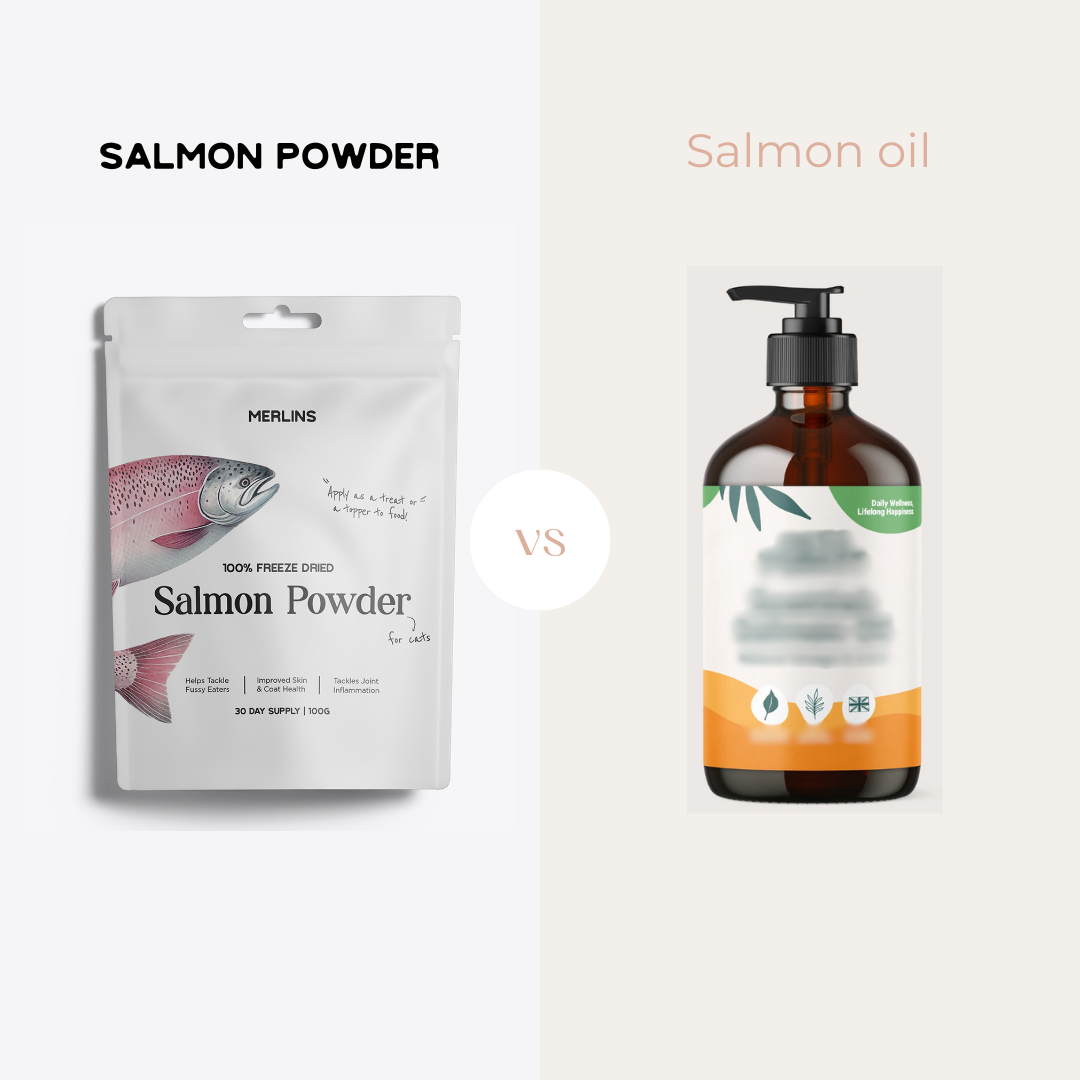
Salmon Oil Vs Salmon Powder
Share
Why Salmon Oil May Not Be the Best Choice for Your Cat – And a Better Alternative
Salmon oil is widely promoted as a beneficial supplement for cats due to its high omega-3 fatty acid content, which supports skin, coat, joint, and cognitive health. However, many cat owners face challenges when using salmon oil, particularly due to its tendency to go rancid and its strong odor, which some cats find unappealing. In this article, we explore why salmon oil may not be the best option for your feline friend and why freeze-dried salmon powder offers a superior alternative.
The Problem with Salmon Oil: Rancidity and Oxidation
One of the biggest issues with salmon oil is its susceptibility to oxidation. When exposed to air, light, or heat, the oil begins to break down, leading to rancidity. Rancid oils not only smell unpleasant but can also lose their nutritional value and may even produce harmful compounds that are detrimental to your cat’s health.
A study published in the Journal of Food Science found that fish oils, including salmon oil, have a high oxidation rate, which accelerates once the bottle is opened and exposed to air. This process is nearly impossible to avoid, even when storing the oil in the fridge or using antioxidant additives (Shahidi & Ambigaipalan, 2018). The result is a strong, unpleasant fishy odor that many cat owners notice around the bottle's seal and in their cat’s food.
Cats and Their Sensitivity to Smells
Cats have an exceptionally strong sense of smell, about 14 times more sensitive than humans. This heightened olfactory ability means that even slight changes in the scent of their food can lead to rejection. A study on feline food preferences published in Applied Animal Behaviour Science highlights that cats are particularly sensitive to the smell of oxidized fats and may refuse food containing rancid oils (Bradshaw et al., 2011).
Many cat owners report that their pets are put off by the intense, fishy smell of salmon oil, especially if it has started to go rancid. Even fresh salmon oil has a strong odor that some cats find unappetizing, making supplementation difficult.
A Better Alternative: Freeze-Dried Salmon Powder
To overcome these issues, freeze-dried salmon powder offers a highly palatable and nutritionally rich alternative to salmon oil. Here’s why it’s the superior choice for your cat:
-
No Risk of Rancidity – Unlike oils, freeze-dried salmon powder retains its stability without the risk of oxidation, ensuring your cat receives fresh and effective omega-3s.
-
Highly Palatable – Made from 100% natural salmon, the powder has a more appealing taste and scent for cats, making it an excellent option for fussy eaters.
-
Easy to Use – It can be sprinkled over food or mixed with water for added hydration, eliminating the mess and hassle of liquid oils.
-
Rich in Essential Nutrients – Still packed with omega-3 fatty acids, freeze-dried salmon powder supports skin, coat, joint, and brain health just as effectively as salmon oil—without the downsides.
Conclusion
While salmon oil is a popular supplement for cats, its tendency to go rancid and its strong smell can make it an unappealing choice. Cats, being highly sensitive to odors, may reject food that has even a hint of oxidized oil. Freeze-dried salmon powder provides a superior alternative, delivering all the health benefits of omega-3s in a stable, palatable, and easy-to-use form.
By switching to freeze-dried salmon powder, cat owners can ensure their feline companions receive the best nutrition without the drawbacks of traditional salmon oil.
References:
1.PubMed – Lipid Oxidation and Its Impact on Food Quality – https://pubmed.ncbi.nlm.nih.gov/
2.PubMed – Feline Food Preferences and Sensitivity to Oxidized Fats – https://pubmed.ncbi.nlm.nih.gov/
3.PetMD – Fish Oil for Cats: Benefits and Risks – https://www.petmd.com/cat/general-health/fish-oil-cats
4.JustAnswer – How to Tell if Fish Oil Has Gone Rancid – https://www.justanswer.com/veterinary/k78tl-tell-bottle-fish-oil-bought-cat.html
